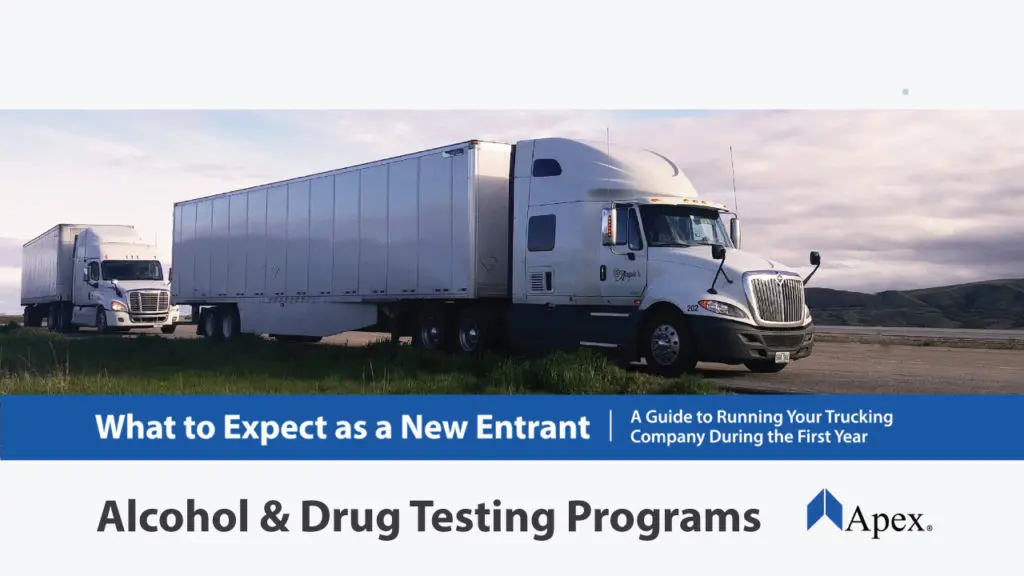A Guide to Your First Year in Trucking
We’ve put together a series of short videos to show you what you can expect in the first year after you start your own trucking company.
Let’s look at alcohol and drug testing program requirements for trucking companies. Every trucking company is required to have drug and alcohol testing policies and follow the testing, storage and record-keeping rules.
Read the Transcript
This video series, What to Expect as a New Entrant, A Guide to Running Your Trucking Company during the First Year has been developed by Apex Capital to help you understand the policies and procedures that you must have in place in order to pass your safety audit and receive your permanent operating authority.
Today we are talking to Reghan Orman about Alcohol & Drug Testing Programs. Reghan is Associate General Counsel at Apex Capital and she also leads the Apex Startup Program. A program that’s designed to help those interested in starting a trucking company get their operating authority.
Why is it necessary to have an alcohol and drug testing program?
Well, the FMCSA, the Federal Motor Carrier Safety Administration, they require every motor carrier to have an alcohol and drug testing program in place. And this helps the FMCSA to ensure that they are doing their part in preventing accidents and injuries related to the misuse of alcohol and other controlled substances.
What should I do to ensure that my program is compliant?
To have a compliant alcohol and drug testing program, you need to make sure that you are testing for marijuana, cocaine, opiates, amphetamines, methamphetamine, pcp, as well as blood and alcohol levels of .02 or greater. When you are sending your results off to a lab, you also need to make sure that you are sending it to a lab that has been certified by the Department of Health and Human Services.
When should drivers be tested?
You need to test your drivers according to your drug and alcohol policy at five different points in time. So, the first one is before they’re even hired, you have to put them through drug and alcohol testing. Second, you have to test them after a driver has been involved in any sort of accident. Third, you need to test your drivers if you suspect they are under the influence of alcohol or other controlled substances. Fourth, you’re going to have to test your drivers upon their return to duty after they have had a positive alcohol or drug test result as well as if they have refused testing in the first place. And finally, fifth, you’re going to have to conduct random testing of your drivers.
Now that randomness has to be according to a scientifically valid method, it can’t just be you picking and choosing what drivers you’re going to test. Now, I’ll also point out that the FMCSA recently decreased the number of drivers that you have to test from 50% to 25% of your average number of drivers every year.
How should I store my records?
When storing your alcohol and drug testing records, security is a top concern. So, you want to make sure they’re stored in locked cabinets, or some other similarly secured area. Also, some of those records can be kept online, others have to be in a physical form though. Now, the time for how long you have to keep those records depends on the type of record.
For any negative drug test results or blood alcohol levels of .02 or less, they need to be kept at least one year. All of your alcohol and drug testing collection records of the processes you used have to be kept for two years. Any sort of records regarding drug and alcohol testing from your drivers’ previous employers have to be kept for three years. And if you want more information on the records that you’re getting from your drivers previous employers, please watch our video on the Driver Qualification File.
Finally, for five years you have to keep a variety of records. That covers positive test results for drugs or alcohol, as well as refusals to test from those drivers. Any sort of follow-up test you do after positive test results or refusals to test. Any sort of referral you give to your drivers to some substance abuse professional, as well as your evidential testing device calibration records, so any sort of maintenance you’re doing on the device you’re using to test for blood alcohol levels. Then finally, any sort of education or training you have with your drivers involving drugs and alcohol has to be kept indefinitely. So that’s probably the most important one.
See the Rest of our Series:
Trucking Insurance Requirements
International Fuel Tax Agreement (IFTA)
Safety Regulations for Trucking Companies
New Entrants: Additional Filings
Get the Free Guide to Running Your Trucking Company During the First Year
To learn more about what to expect in your first year of trucking, download our free white paper and subscribe to our channel on YouTube.
If you want to start your own trucking company, give us a call at 844-827-4524 to learn more about how our Startup Program can help make the process fast and easy.
